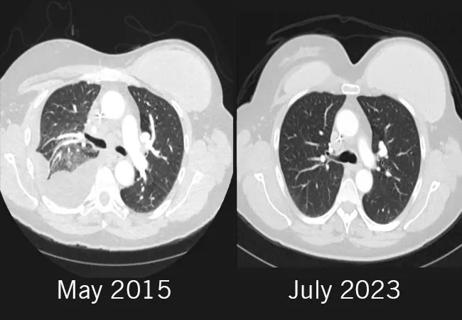Podcast content: This podcast is available to listen to online.
Listen to podcast online (https://www.buzzsprout.com/2241774/15342167)
Triple negative breast cancer is twice as common in Black women than it is in white women, particularly at early ages. Holly Pederson, MD, director of Medical Breast Services in Cleveland Clinic’s Breast Center, conducted research using polygenic risk scores to predict early-onset triple-negative breast cancer (TNBC) in Black women.
Advertisement
Cleveland Clinic is a non-profit academic medical center. Advertising on our site helps support our mission. We do not endorse non-Cleveland Clinic products or services. Policy
“What we found is that in looking at the polygenic risk score, it really did help to predict which young Black women were going to develop breast cancer period and which develop triple-negative breast cancer, which is biologically one of the most aggressive types,” says Dr. Pederson, who presented her findings earlier this year at the American Society of Clinical Oncology Annual Meeting.
In a recent episode of Cleveland Clinic’s Cancer Advances podcast, Dr. Pederson shared details of her research and its potential impact on clinical care.
“We’re trying to catch women before they develop breast cancer,” she says. “Our dream is to try to identify those so that we can make interventions before somebody gets sick. I think it could be a paradigm changer.”
During the podcast, Dr. Pederson delves into:
Click the podcast player above to listen to the episode now, or read on for a short edited excerpt. Check out more Cancer Advances episodes at clevelandclinic.org/podcasts/cancer-advances or wherever you get your podcasts.
Excerpt from the podcast:
Podcast host Dale Shepard, MD, PhD: If we come up with a test like this sort of multiple ancestry polygenic risk score, for instance, and we can identify high-low risk – put people in risk categories – what is the most effective thing to do clinically with that?
Advertisement
Dr. Pederson: So, what would we potentially do with this information? I think that the most important thing is early and more sensitive screening. It's been shown in our BRCA population that women in their 30s, the sensitivity of their screening mammograms – the chance that you will find cancer if it's there – is about 30%, meaning we're going to miss 70% of breast cancers in women in their 30s on a mammogram due to the breast density typically. And breast MRI is a highly sensitive test that could be offered to young women annually to catch things early.
It makes all the difference in the world to identify cancers at their earliest, most treatable and curable stage. And remember, these are young women who develop cancer before screening would even be undertaken, and often they aren't taken seriously by their primary care provider when they bring up a concern because they're so young. And this potentially could identify people who could undergo enhanced surveillance or screening with breast MRI.
There's a medication tamoxifen in some patients that may be useful to reduce risk, and with a significant family history one might even consider risk-reducing surgery, not on the basis of this test, but on the basis of their other risk factors, including their family history. It also would give us an opportunity with these young women to stress lifestyle modification. About 30% of cancers in this country are caused by the obesity epidemic, and that hits the Black community even harder than the Caucasian community. And it really is an important risk factor.
Advertisement
Advertisement

Real-world results reporting aims to make treatments safer and more effective

Obstructing key protein allows for increased treatment uptake for taxane chemotherapy

Combination of olaparib and carboplatin results in complete durable response for a patient with BRCA2 and “BRCAness” mutations

Phase 1 study demonstrates immune response in three quarters of patients with triple-negative breast cancer

Genetic variants exist irrespective of family history or other contributing factors

Percutaneous stabilization can increase mobility without disrupting cancer treatment

New guidelines update recommendations

Simple score uses clinical factors to identify patients who might benefit from earlier screening